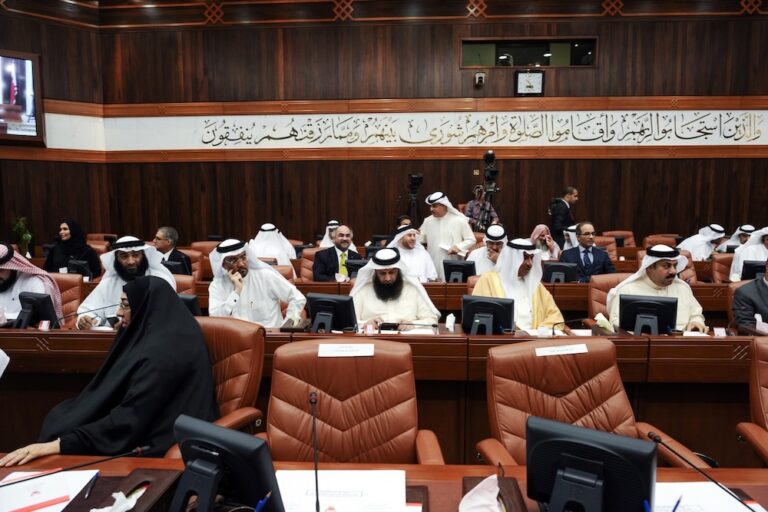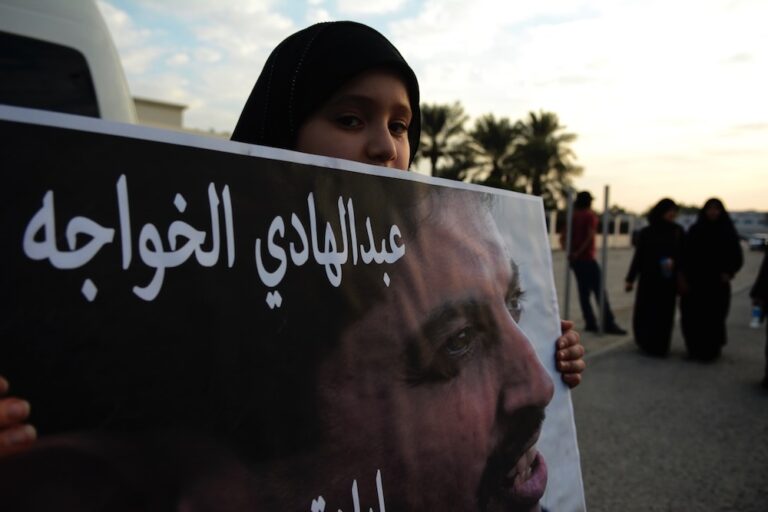Hussein Al-Dirazi and Mohammed Mushaimea complained of cruel treatment and torture during their detention on charges of "transmitting photos that would bring harm to Bahrain".
(BCHR/IFEX) – The Bahrain Center for Human Rights (BCHR) expresses its deep concern over the fact that the Bahraini government continues to criminalise activists simply for practicing their rights, and especially their right to freedom of opinion, expression and publishing. The authorities have resorted to the use of torture and cruel treatment to extract confessions. This was mostly recently illustrated by the arrest and torture of two detainees on the charge of distributing photos about Bahrain’s reality to international news channels and agencies.
On 7 October 2010, the first court sessions in the case of detainees Hussein Al-Dirazi and Mohammed Mushaimea were initiated. The Prosecution charged them with “transmitting photos that would bring harm to Bahrain abroad”. Mushaimea was further accused of collaborating with Al-Dirazi by receiving the photos during his stay in London and transmitting them to officials at one of the foreign channels who subsequently published them.
The detainees complained that the interrogators had taken their statements by force “under torture, coercion and beating”. Al-Dirazi complained to the judge that he is being subjected to severe beatings and hanging by the hands and feet in the Falaqa way. The marks of torture are still apparent on his wrists, he said. The two detainees complained that they were beaten all over their bodies, including the soles of their feet. They were also allegedly forced to walk so that the marks from the beating and the swelling would disappear from their feet. Mushaimea and Al-Dirazi said they were forced to stand for long hours, and were deprived of sleep for days.
Until the second court session, their lawyers had not been able to meet with the detainees because the police had forbidden them from doing so, even though the Judge had granted permission to the lawyers to meet with their clients.
At dawn on 13 September, the security forces raided the house of Hasan Mushaimea, one of the leaders of the Haq Opposition Movement and one of the main defendants in what is named the terrorist cell. He is in Britain being treated for cancer. The authorities thoroughly inspected his house without a search warrant, according to information given to BCHR by his family. The security forces confiscated computers before arresting his son, Mohammed Mushaimea. The arrest took place a few hours after his father, Hasan Mushaimea, appeared on one of the TV channels to speak about the deteriorating situation of human rights in Bahrain.
Meanwhile, on 2 October the security forces arrested Bahraini football player Mahdi Sa’ad and banned him from travelling. The incident occurred as the 21-year-old was heading to Poland with the national team mission as part of preparations for the Handball World Cup. This arrest took place shortly after his sister appeared on one of the TV channels (BBC Arabic) and spoke about the circumstances of the forced disappearance of their blind brother, Ali Sa’ad, who had already been sentenced to 10 years in prison. Since Ali Sa’ad was arrested in September, his family has not been told where he is being held or given permission to visit him.
BCHR believes that arresting and harassing the relatives and children of individuals who speak out on a TV channel or news agency demonstrates the authorities’ resistance to critics. It is an attempt by the authorities to conceal the reality of what is happening in Bahrain from the world’s public opinion.
According to BCHR, transmitting photos or news about incidents in Bahrain to international news channels and agencies cannot be considered a crime in any form; rather, it is the people’s right to express themselves. The arbitrary arrests and trials that target freedom of opinion and expression emphasise the government’s failure to convince the world of the wrong image it is attempting to promote in order to justify the deteriorating human rights condition in Bahrain. The Bahraini government is enforcing a media ban on all news related to the case of the cell and the incidents relevant to it.
BCHR calls upon all journalists, media workers and bloggers to continue to broadcast the media coverage about human rights conditions in Bahrain, and to communicate with all individuals and public institutes to obtain the other side of the reality of the situation, which the government is trying to conceal from the world press and international public opinion.
(. . . )


